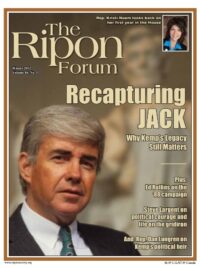There’s a classic scene in the movie, “Gladiator,” in which the aging Emperor, Marcus Aurelius, talks to his top General, Maximus Decimus Meridius, about his vision for the future and what he hopes their country will one day achieve.
“There once was a dream that was Rome,” the dying old man tells the dashing young warrior. “You could only whisper it. Anything more than a whisper, and it would vanish… it was so fragile. And I fear that it will not survive the winter.”
For many Republicans who were young at the time, and for many other Republicans who look back on at that time fondly today, the 1988 campaign of Jack Kemp for President represents, in some ways, the GOP equivalent of the “dream that was Rome.” It was a moment when the possibilities that lie ahead for the party truly seemed to be without end.
Coming off the second term of one of the most successful administrations in recent history. Basking in the glow of one of the most popular Republican Presidents of all time. Enjoying the fruits of a domestic agenda that not only helped power the American economy to record growth, but helped bring the Soviet Union to its knees and an Evil Empire crashing to the ground.
For the Republican Party – and for America, for that matter – these were indeed the golden years. And no one seemed more suited to lead our party and our nation on the next part of its great journey than Jack Kemp, the dashing young congressman from New York who many saw as the aging President Ronald Reagan’s rightful heir.
In Kemp, many saw a leader who could expand the coalition that Reagan built into a permanent majority that included minorities and members of the working class. In Kemp, many saw a visionary who preached the gospel of free market conservatism but also understood that limited government could at times have an important use. In Kemp, many saw a passionate defender of freedom who understood that peace, once earned, must always be protected.
In short, in Jack Kemp many saw the 41st President of the United States. But it wasn’t to be. His campaign, launched a quarter century ago this spring, barely got off the ground. Lasting only 339 days, Kemp exited the race after Super Tuesday. And yet his impact is being felt more and more today. It started three years ago, just after his untimely death from cancer at the age of 73.
“Jack was the reason I ran for Congress,” stated Wisconsin Congressman Paul Ryan of the man for whom, as a young staffer fresh out of college, he once worked. Similarly, when asked in a Winter 2011 Ripon Profile to name the Member of Congress he admired the most, freshman Congressman Tim Scott’s answer was succinct: “Jack Kemp.”
To the extent that Ryan and Scott represent the future of the Republican Party and can be considered two of the GOP’s new guiding lights, then perhaps it is a good time to look at the man from whom they took their inspiration to run and serve.
For that reason, we examine some of the contributions of the late Jack Kemp in this edition of the FORUM, and encourage you to write us at editor@clu.ccw.mybluehost.me with any thoughts or comments you might have.
Lou Zickar
Editor
The Ripon Forum




